Research on smart vehicle plate number
Abstract
There are around 3 million cars in UAE. According to the gulfnew.com there were around 3,700 deaths due to accidents last year. There are several reasons of these accidents such as drinking and driving, not following traffic rules, malfunction of vehicle but the most important cause for these accidents was over speeding. The UAE police is every year trying to take new initiatives in order to reduce these accidents.
They have installed more and more police radars to check that people follow speed guidelines. It is observed that people understand where these radars are installed and therefore they use the blind spots of these radars. Due to these there are large number of accidents seen every year. It has been recorded that not less than 80% of accidents are seen in these blind spots.
Here, we understood that the police department has to install more and more radars in every area and will have to increase more on road police in order to control the over speeding. But, this will require a lot of money as these radars are very costly and lot of manpower will be required to cover each and every road in the country. This sounds to be close to impossible.
In order to solve this problem we came up with a solution. The basic idea behind our solution is why one need to chase or monitor a vehicle on every road, instead there should be a way such that the vehicle monitors its own speed and notify the police department if the violation is made. This idea can save a lot of money and manpower. Applying this idea police department can stay at one place and at the same time monitor all the vehicles across the country.
Whenever the violation of speeding rules is observed the system installed inside the vehicle will notify it to nearest police department and the necessary action can be taken by the police. This will save a lot of time and even fuel as police will no longer require to patrol on the streets. One important question is to decide where this set up can be installed.
We have decided to install this on the number plate, as it will be provided by the government so that no discrepancies can be seen. If we ask the owner of vehicles to install them inside the vehicle they can find a way to cheat the department but installing it on number plate will be a transparent method.
The basic technologies involved in this smart number plate include a remote GPS, raspberry pie and an OBD scanner. The combination of these technologies can be used in order to construct our vehicle speed monitoring system. This system will be mobile and can be installed on the number plate, making it a smart number plate.
The functioning of this system will include these steps:
- Continuous monitoring of the speed of vehicle.
- If the speed increases a specific limit (which will be changed based on the location) a message will be generated.
- The message will include details of speed and location of the vehicle (data fetched using the technologies installed).
- This message will be sent to the nearest police department.
The role of the various technologies are as follows:
- OBD scanner: Helps in monitoring speed.
- GPS: Tracks current location and sends the data continuously to raspberry pie.
- Raspberry pie: This is the main controlling or calculation unit of the device. Here the data provided by the GPS will be used to calculate the speed. The speed will be monitored based on the speed limit of a particular location and its speed limit. Finally, message will be sent to the police department if the speed limit is exceeded.
The benefit of this system is that it is affordable for the government as compared to the cost of installing speed radars at various location across the country and deploying a lot of man power. Secondly, it is a very effective way of keeping speed in check as instead of other monitoring vehicle, a vehicle is monitoring itself. We expect this solution to bring down the accident rates by a very big margin.
Introduction and Research Background
Background research
A survey conducted by gulf news on accidents in UAE has given some shocking figures. It was obtained that even on the day when this survey was conducted there were four accidents in just a period of two hours. Only between the months of January to July last year, there were more than 1,250 accidents involved car. These accidents were the major accidents which either cost life or serious injuries. In these accidents around 23 people were killed and 884 were injured. In the same duration there were cases of car crashes and this cost 76 lives and 996 people with serious injuries.
The drivers who lost their lives were not only ones over speeding but the ones who were following traffic rules and because of the mistake of other drivers they lost their lives. The UAE police is trying its best to reduce these casualties by imposing strict traffic rules. It is noted that UAE drivers pay dirhams in thousands every year. Last year only in the first quarter around 26 hundred thousand people were fined because of over speeding.
The fines are not only paid by the local drivers but also by the tourist visiting UAE every year. A tourist was charged more than 17 hundred thousand in less than four hours for over speeding. As according to the law made by UAE government, it can charge more than 1,000 Dirhams for driving at a speed of more than 60 km per hour. The UAE government gives the police power to completely cease or impound a vehicle if found over speeding. Despite of such strict rules we observe that people are still dying.
Introduction
I have been driving for quite a long time. Each time I take the ride from Al Ain to Dubai, I perceive how individuals drive. A few jumpers adhere to street rules including speed cutoff points and others don't. In various events, I have seen terrible mishaps with individuals kicked the bucket and others genuinely harmed. I have wondered why that is occurring if there are radars hugely introduced over the street. Why radars are not implementing individuals to back off and follow speed limits. The explanation is that drivers are radar mindful and in this way they make insane constantly and back off when they approach a radar. This point of view of radars pursuing vehicles is an inappropriate methodology. Be that as it may, scarcely any nations have executed preventive measures to wipe out this. Moreover, nations are toward discovering progressively proficient and practical techniques to supplant radars.
"Considering the street wellbeing another method is depicted to distinguish the quickly moving vehicle and charge them fine for disrupting the guidelines. This methodology includes fixing a gadget called RuBee in all the vehicles (like the tag) and by introducing two recipients at a particular separation (state 100 meter). RuBee is a remote convention which can send some extraordinary information to the recipient. The Receivers get and store the License plate subtleties alongside TIME and time contrast between the collectors and it is utilized to figure the speed. Speed is dictated by utilizing Distance - Time - Rate recipe with the assistance of preparing unit. An overabundance speed estimation calculation is utilized to discover the quickly moving vehicle. In the event that the vehicle over speeding is found from the count the speeding punishment will be charged by recording a body of evidence against the proprietor of the vehicle".
"The essential idea of the framework depends on the accompanying technique: building up a trial framework to produce arbitrary speed information, which can speak to vehicle speed out and about and building up a product to screen and deal with the speed information remotely. A remote sensor joined with a mechanical wheel quantifies the increasing speed vibration of the framework, which is equal to wheel speed and transmits the information remotely to a PC. A product (SpeedManage) has been created utilizing Java Socket programming codes which changes over the vibration information to comparable speed information and presents these in a Graphical User Interface (GUI). On the off chance that the recognized speed is more noteworthy than a set speed limit, the information will be consequently spared in a focal database as an electronic report for making any further move".
Smart vehicle plate number could be the most productive practical vehicle observing framework. Checking the Vehicle's speed starts once the driver turns over the motor. A couple of months subsequent to actualizing such a framework, vehicle mishaps will drop down. What's more, the framework is fit for adding all the more observing highlights to the framework, for example, following vehicles and keep up measurable information for city and street arranging.
Problem statement
Every year thousands of people are effected due to accidents. Major reason for these accidents are over speeding. Although there are various steps taken by the UAE government such as installation of speed radars, deploying police on streets, high fine on breaking of rules, etc. yet there are cases of loss of both life and property.
Also the speed radars and police force present on ground cannot be spread across the country as it will require high costs and some places may be such where one cannot install either. Therefore there is a need of some technology which monitors vehicle and controls the drivers from over speeding. The device should be such that it should not only monitor the vehicle speed but also notify the police department when and where the over speeding was seen. This will help the government save millions of dollars and will reduce the casualties and loss of property at the same time.
Aim of the project
The aim of this project is to build a device which is concise by at the same time accurate. We will be required to use the modern day cutting edge technologies in order to construct this device. This device should be installed on the vehicle. The main functionalities of this device should include constant observing of the speed of the vehicle, In the event that the speed builds a particular breaking point a message will be produced. The message will incorporate subtleties of the speed and area of the vehicle. This message will be sent to the closest police station.
It is important to understand that the device should not cost more as it will installed in every car. If the device is costly then it will be difficult for the government to arrange funds in order to install them in each and every vehicle across the country. Also the size of device should be such that it can be installed on the vehicle and it doesn’t hamper the normal functioning of the vehicle.
The device should be such that it uses more than one type of technology in order to monitor the speed so that in a case of failure of one technology another technology should step in. Also if more than one technologies are used it makes sure that the values obtained are accurate as the internal system of the device can verify or compare both the data.
Objectives
This device can be used by used by various organizations following are some of the objectives or applications of smart number plate:
- Police department: This can be used by police department for following purposes:
- Monitoring the traffic: The Smart number plate is enabled with GPS applications, this can be used to know the location of the vehicles. If the vehicle is more in a particular region the GPS will send the signals to the police department simultaneously. This way the department can understand there is a traffic jam in a particular region. This will help them plan and take necessary steps.
- Vehicle speeds: One can fool the speed radars but not the Smart number plate. Smart number plate is designed in such a way that it monitors speed at every part of journey starting from point A to point B. A driver whenever driving is monitored by the Smart number plate. The data of the speed can be continuously obtained by the police department. Other than that they can know when one is over speeding. The time and place of the over speeding will be sent to the department as well, this will help police to take necessary actions accordingly.
- Immediate arrests: In case of a driver not reducing the speed due to malfunctioning of the vehicle or any other reason, the police can track the vehicle immediately and the police cars which are available in that particular area can immediately arrest or save the individual driver and other pedestrians.
- Number of accidents: The number of accidents are not exactly known because of sometimes driver escaping after the accident or due to not filing of complaints. This will help police to bring people to justice and at the same time keep a record of number of accidents in a particular period of time.
- Department of city planning: The department of city planning can use the data provided by the Smart number plate in order to understand the reason behind the accidents. Some time it may be possible that some geographic locations are such that it leads to accidents. The improper roads, too curved turns, improper connection of two, cross roads etc. leads to accidents.
City planning department can analyze these reasons they can then rectify these problems or defects in planning the city. Also while building new roads the department can make sure that they don’t repeat these mistakes. This will reduce casualties by a considerable margin. This way Smart number plate could be helpful to City planning department.
- Security departments: Security department can use this technology in order to track any particular vehicle. Say for example if a criminal is on loose. Security department instead of looking for him/her on CC TV cameras can now directly track the particular vehicle the criminal is in. The exact location can be obtained. This could help in pre planning such as road block or evacuation of a place. This way Smart number plate could be helpful to security department.
- Lost car: In case the car is stolen instead of looking for them in various location using cameras present there, police department using this GPS can find the exact location of the car. Hence the Smart number plate will help in stolen cars as well.
Literature review
The drivers are tend to go over the speed limits, mostly on highways. These leads to a lot of causalities. There are numerous ways to keep driver in check and control them from over speeding. But the methods are either costly or require a huge man power. A device is built which is powered by raspberry pie and GPS technology. The combination of two helps in calculating the speed of the vehicle. The GPS tracks the current location and simultaneously gets the speed limit for that particular region. If the driver exceeds the speed limit its data is sent to the responsible authority. There are numerous advantage in using these technologies they are minimal cost, remote monitoring, high reliability and wide coverage. There is limitation to these system that is it doesn’t function in low network region. SIM 908 module has been used in similar devices named Linkit but there are cases when the damage of the module leads to very inaccurate values. The replacement is required at a more frequent rate. The GPS data is stored in memory cards but it is ineffective as it doesn’t provide a real time speed monitoring option. Linkit has less mobility as it requires wifi connection with it.
A device was constructed on the concepts of GMR sensor. It was built in a way that it measures the speed of vehicles by the changes in magnetic field. The benefit of this technology was it didn’t require any wire or continuous power supply. But at the same time it was based on image processing and GMR sensors so it will be required to be installed at various places and manpower will be required to monitor the system.
A simple two point device was also used, it was such that it recorded the incoming of vehicle at point A and again will record the time of incoming of vehicle at point B. Then simply by using distance by time one can calculate the speed of the vehicle. This method of speed monitoring is not effective as it will require installation of such setups at various locations and improper weather conditions might lead to lose of visibility of the sensors thereby vehicles going unmonitored.
The growing rate of casualties and death has led to foundation of a device powered by IOT. The device uses technologies such as raspberry pie and is powered by machine learning algorithms. The device in case of a casualty analyzes the severity of the accident using the machine learning algorithms and on basis of its severity notifies the responsible authorities with the help of GPS and messaging modules. The location obtained by the authorities can help them to reach out to the individual. This is an excellent application of IOT but we see that this device has its application only in the case of accidents. The do not ensure the prevention of experiments by warning driving of not over speeding. Also it doesn’t ensure safety of other vehicles or pedestrians who might have been affected due to other’s mistake.
An intelligent technology with the help of IOT can reduce the casualties due to over speeding. A device enabled with GPS with the help of intelligence can know the speed limit of that particular region and details such as if that region is an accident prone zone and then the speed limit is adjusted accordingly. If an individual goes beyond the speed limit the responsible authorities are informed immediately. But there are few limitations to this, the GPS technology used in order to calculate the speed of the vehicle requires a continuous network connection. If proper network is not available then it won’t function properly other than this, the device is powered using a battery of 12V which gives it a life on 5-6 hours. If an individual goes on a long drive than after a point of time the authorities will be blind they won’t able to know the vehicle is right now.
Upcoming accidents can be predicted using a combination of various sensors which will monitor the face of human and activities which are unusual. Such as frequent blinking of eyes, alcohol detection, blood pressure detection, etc. The device uses node MCU for tracking the system. Along with these there will two ultrasonic sensors which will monitor incoming vehicles. If any unusual activities are monitored an alarm will beep and a notification will be sent via mail to a person in close relation. This is a very brilliant application of IOT and intelligence but the problem here being that there are no coverage of issues which involve human errors and no involvement of authorities in taking necessary actions.
With increase in vehicles on road, it is important to impose strict rules. But it is a human nature to break a rule. So in order to maintain the law and order it is important to introduce some kind of system which can keep these in check. An automatic and smart speed monitoring system can be installed in a vehicle such that it monitors the speed of a vehicle continuously and send the data using frequency modulation and WIFI. These system was simple and easy to implement. The problem here lies is that the data will be sent continuously which will increase the amount of data required to be monitored at a point of time. Instead of sending raw data to the authority if there was a system which could monitor the speed comparing it with the speed limit of that place at the same time and if necessary then and only then notify the authorities. One more drawback is the network availability. This device will be a complete failure in the place of no network connection.
Materials
The efforts are made in order to keep the cost of the project low. Therefore only limited number of components have been used. The four main components of the Smart number plate are as follows:
- OBD Super Mini BT ELM327 V2.1 Bluetooth OBD2 Scanner Tool Vehicle Scan Auto Adapter Check Engine Diagnostic Tool for Android Torque/PC

Fig 1. OBD Super Mini BT ELM327 V2.1 Bluetooth OBD2 Scanne
Features and specifications:
- Peruse symptomatic difficulty codes, vague and maker explicit, and show their importance (more than 3000 code definitions in the database).
- For your vehicle to be OBD II consistent it must have a 16-pin DLC (Data Link Connector) under the scramble and the Vehicle Emission Control Information Label must express that the vehicle is OBD II compliant. Retrieve Fault Codes (DTCs) and clear Check Engine lights.
- Show current sensor information, including Engine RPM, Calculated Load Value, Coolant Temperature, Fuel System Status, Vehicle Speed, Short Term Fuel Trim, Long Term Fuel Trim, Intake Manifold Pressure, Timing Advance, Intake Air Temperature, Air Flow Rate, Absolute Throttle Position, Oxygen sensor voltages/related transient fuel trims, Fuel System status, Fuel Pressure.
Application in project:
The main application of this component is to monitor the speed of the vehicle. The OBD continuously records the speed and sends the value back to the raspberry pie. The raspberry pie with the help of the GPS knows the exact location of the vehicle and finds the speed limit of that place.
This component is very important as it helps in recording the speed more accurately as the data obtained via GPS is verified and the accurate data is stored in raspberry pie. The use of this component could have been avoided but using this gives immense accuracy to the Smart number plate hence we have included it.
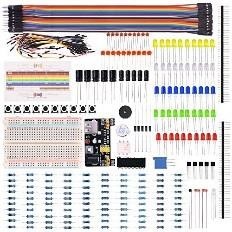
Fig. 2. Kuman Electronic Fans Bundle Learning Kit for Arduino Raspberry pi
Components of the Kit:
400 tie-points Breadboard X 1
Power Supply Module X 1
Female-to-male Dupont Wire X 20
65 Jumper Wire X 1
Precision Potentiometer X 1
Active Buzzer X 1
IC 4N35 X 1
Passive Buzzer X 1
Thermistor X 1
IC 74HC595 X 1
Diode Rectifier (1N4007) X 5
NPN Transistor (PN2222) X 5
Photoresistor X 2
RGB LED X 1
Button X 10
White LEDX 10
Yellow LED X 10
Blue LED X 10
Green LED X 10
Red LED X 10
22pf Ceramic Capacitor X 10
104 Ceramic Capacitor X 10
Resistor (10R) X 10
Resistor (100R) X 10
Resistor (220R) X 10
Resistor (330R) X 10
Resistor (1K) X 10
Resistor (2K) X 10
Resistor (5K1) X 10
Resistor (10K) X 10
Resistor (100K) X 10
Resistor (1M) X 10
Resistance Card X 1
Pin header (40pin) X 2
Electrolytic Capacitor (10UF 50V) X 5
Electrolytic Capacitor (100UF 50V) X 5
Plastic Box X 1
Application in the project:
In order to construct the structure of the device and make connections between the raspberry pie, GPS and OBD. These components are responsible for the transferring of the data among the three major parts of Smart number plate.

Fig. 3. CanaKit Raspberry Pi 3 Kit with Clear Case and 2.5A Power Supply
Components:
* Raspberry Pi 3 (RPi3) Model B Quad-Core 1.2 GHz 1 GB RAM
* CanaKit 2.5A Micro USB Power Supply with Noise Filter (UL Listed) specially designed for the Raspberry Pi 3 (5-foot
cable)
* Premium High Quality Clear Case
* Set of 2 Heat Sinks
* CanaKit Raspberry Pi 3 Quick-Start Guide
Application in the project:
Raspberry pie is small sized computer. It is portable and compact. Once programmed it can perform various calculations on its own. It is of low cost and affordable. In our project raspberry pie acts as the head of the device. It is the one which takes all the decisions according to the data received.
Here, the information or the value of speed obtained from the OBD and the speed calculated by changing in position and time taken (calculated by raspberry pie itself) are compared and more accurate value is taken into account. Also there is a possibility that at same places OBD or GPS might not function then raspberry pie chooses the option which is still functioning.
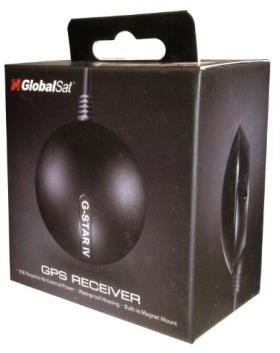
Fig. 4 GlobalSat BU-353-S4 USB GPS Receiver (Black)
Components:
Built-In GPS Patch Antenna
Built-In Roof Mount Magnet
48-Channel All-In-View Tracking
SiRF Star IV GPS Chipset
WAAS/ EGNOS Support
Application in the project:
Provides continuous location values to the raspberry pie. Raspberry pie records the data continuously and this change in data with time helps the raspberry pie to calculate the velocity. Other than that this GPS can help various departments to track the exact location of car.
Methodology
Prototyping is the principle strategy utilized in the usage of the task. The different material referenced above utilized in making the model of the savvy plate number. The model will experience three principle stages as demonstrated as follows:

Fig. 5. Stages of methodology
- Requirements: There are two major types of requirements they are as follows:
- Functional requirement: The functions which is expected to be performed by the device. For Smart number plate the functional requirements will be as follows:
- Continuous monitoring of the speed of vehicle.
- Ensuring the accuracy of the values of speed obtained.
- A message should be generated when the vehicle crosses speed limit.
- The message should include details of speed and location of the vehicle
- This message should be sent to the nearest police department.
- Non Functional requirements: These are the requirements which a device is expected to follow and is not a part of its regular functioning. They are as follows:
- Ensuring security of the data of an individual.
- The data shared by the device should be shared only to the responsible authority.
- The data should be protected or encrypted in a way that no other individual or an organization should be able to access the location or other relevant details.
- Quick design:
We build a quick design by keeping all the components together. We ensured that the size of the gadget is as compact as possible. There were challenges to arrange the components in a way that the size should be as small as possible. We also designed Smart number plate in a way that it was efficient in communicating with the monitoring source which in our case is police control room. Also we made sure that the design was such that the OBD and GPS worked properly.
- Building the prototype:
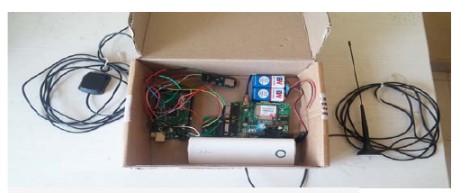
Fig. 6 Prototype image
The design which was formed using the functional requirements in the previous stage was used to in order to build a working prototype. The prototype was properly functional. It worked according to all its functional requirements. We tested the functioning of prototype in the areas of low and high network in order to see if Smart number plate worked properly in various areas of UAE.
- User evaluation:
Our product has two main users, one are the drivers and the other are UAE police. We talked with some of the regular drivers that how they felt about Smart number plate. We installed one on couple of cars and they were really happy with the performance. The feedback they gave was that they were able to drive without thinking about the speed they are driving on or the speed limit of the that particular road. As soon as the speed exceeded the driver was notified about the same. One driver showed there was some problem with the GPS connectivity in some region.
We talked with a couple of policeman in the control room, even they were impressed with the idea and the device’s performance they wanted us to build an interface through which they could monitor the vehicles.
- Redefining prototype: We made the changes as asked by the driver. We changed the alignment of GPS and rebooted the system. The device started working properly and even the error was rectified.
Step by step functioning of smart plate (Flow of processes)
ON
Start Engine
Compare Speed?
Neutral
Over speeding?
Check Engine Status
Initialization/ Reload
Record Speed Violation
Detect Road Speed
Detect Vehicle Speed
OFF
End
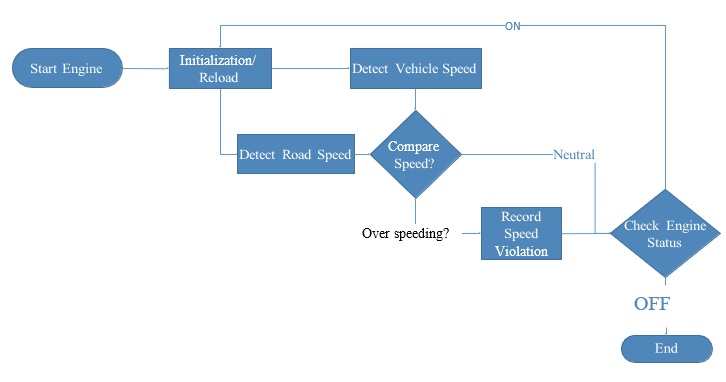
Fig. 7 Step by step functioning of smart plate
- Start Engine: As soon as the driver turns the ignition on the smart plate turns on. The battery starts providing power to GPS and OBD.
- Initialization / Reload: The record values of all devices are set to zero by the raspberry pie. The values stored previously in the raspberry pie are now removed and set to nil. The new recordings and values are now awaited. If the initialization value is set to “on” the process moves to checking the status of vehicle engine. If it is in ignition stage or in off stage.
- Detect Vehicle speed: This is one of the two processes going on simultaneously. Here we detect the speed the vehicle is moving at. This process is performed using two devices namely ODB and GPS. ODB directly monitors and send the value of the recorded speed to the raspberry pie. This value is stored in raspberry pie’s internal memory. Let’s say it is stored under the variable y1. Now, simultaneously we have GPS module which continuously shares location information to the raspberry pie. Even this data is stored in the memory. We have a code written in raspberry which runs a counter of time. Now with the change in location it finds out the total distance calculated and along with it, it measures the speed by diving the total distance travelled by total time taken. This way we obtain the speed of the vehicle. Say, the distance between the points is obtained as o and the time taken is t, then the speed will be o/t. This value will be stored as y2. Both the values i.e. is the one obtained using OBD and the one obtained with the help of GPS is compared and verified. If y1=y2 then we say the values are verified. Then a new variable named y is created and the final value is stored as y=y1=y2. If the values doesn’t match another set of readings is taken until the values matches. This ensures the accuracy of the speed calculated. If one of the component i.e. OBD or GPS is not working the other component will come into the play and we will be able to get the readings. This way using multiple methods helps us to get the accurate value and constant reading at the same time.
- Detect Road speed: While calculating the speed of the car it is important that we know or detect the road speed or in other words we need to know the speed limit of a road to compare it with the vehicle speed. In order to ensure that the vehicle is well inside its speed limits. This process starts from detecting the location of the vehicle and using Google map’s module to fetch the speed limit of that location. Now, this data is stored in the raspberry pie’s memory. We know that one more process was running simultaneously. We obtain the vehicle’s current speed and the road’s speed limit. Suppose the vehicle’s current speed is y and the road’s speed limit is d. Then if y > d a message is generated. If y<d then no message is generated. The process of recording speed and fetching speed of road and comparing them continues.
- Compare speed: The value of vehicle velocity stored in the variable y is compared to the street velocity stored under the variable d. If the value y>d, then the values goes under over speeding protocol. Else it goes under the check engine stage which apparently starts the calculation loop again.
- Speed violation protocol: This is the most important protocol of the device flow cycle. When the value of y increases the value of d this protocol is initiated. The protocol has few steps which are as follows:
- Generating a message: A message is generated which includes the speed of the vehicle at the point when the protocol was called. The message also contains the exact location of the driver when the protocol was called. When the protocol is called raspberry pie sends a command to GPS to send the exact location. The location is stored in the memory for a while. The message is framed filling all the missing spaces i.e. speed of the vehicle and location and then it is sent.
- Sending the message: The message generated is sent to the responsible authority. The raspberry pie commands Google map package to find the nearest police control room. Once it has been found the message is sent to the number registered under that police control room. The messaging module is used in order to send the message. Messaging module is pre-installed in the raspberry pie.
- Check engine status and End: After every cycle of calculating speed of vehicle, fetching street’s speed limit and comparing the two, there is an exit loop step. This step is named as checking engine status. When a cycle is completed raspberry pie send a message to check if the vehicle is still in ignition mode. If raspberry pie receives a reply from vehicle start status, then the process is repeated. If the ignition status is “off”. The loop comes to an end and raspberry pie shuts all the components in order to save electricity. There is a variable named n in which the status is saved if the ignition is “on” we save the value of n as “1”. If the ignition is in the off state we save the value of n as “0”. The numeric value of the ignition status saved under n is easier to understand, save and operate for a raspberry pie.
This the whole methodology by which the device works. The process simply starts with the ignition of the vehicle. There is no need of switching on the device and it switches off when the vehicle’s ignition is off. Thus no individual can go around and fool the device.
Processing the data
The OBD Super Mini BT ELM327 V2.1 segment interfaces with the vehicle by means of a sequential association. It peruses different data about the vehicle including motor status and vehicle speed. The gadget gives exact speed-perusing. At that point the OBD associates with the Processing unit (Raspberry Pi 3) in which is associated with a PC and modified to speak with the GPS by means of the GlobalSat BU-353-S4 USB GPS Receiver. To begin with, the preparing unit gets the vehicle speed from the OBD and vehicle area from the GPS. At that point, the Processing Unit contrasts the Vehicle Speed and the street speed spared in the vehicle's log record and composes any speed infringement in vehicle's speed infringement log document. At last, speed infringement synchronized with the Transport Authority Database.

Fig. 8 processing stages
Several road tests conducted to analyze the operability and accuracy of the prototype.
|
Test# |
Vehicle Speed |
Road Speed |
Result |
|
Test 1 |
38 |
40 |
Neutral |
|
Test 2 |
41 |
40 |
Speed Violation (Ticket Issued) |
|
Test 3 |
80 |
80 |
Neutral |
|
Test 4 |
82 |
80 |
Speed Violation (Ticket Issued) |
|
Test 5 |
121 |
120 |
Speed Violation (Ticket Issued) |
Results and Discussion
The Smart Vehicle Plate Number Project's principle objective is to fetch vehicle speed infringement. The model was tried and effectively recorded speed infringement. The handling unit decides the vehicle area through the GPS. At that point, the handling unit gets street most extreme speed by means of Google Map or some other exact Map specialist organization. Following is the image of how the tracked vehicle trails will look like.
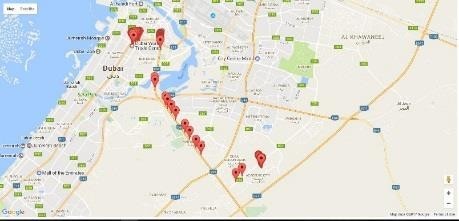
Fig. 9. GPS snapshot
In order to implement this idea in to practice we will require to use Google map’s API. The Google map’s API is free for the companies generating revenue less than $200. So, for the prototype we didn’t require to pay any money. But if we turn this idea in to business we will have to buy the yearly subscription. Also the second major user of our device which is transport authority, we will have to come into agreement with them.
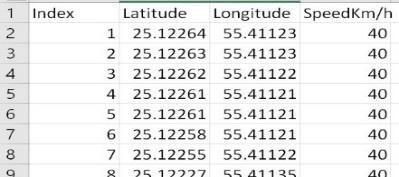
Fig. 10 Calculations in raspberry pie
This above image shows the latitude and longitude recorded by the GPS. The raspberry pie uses these coordinates and the time recorded using the time to calculate the speed in km per hour. We can see that for the case we have considered here the speed was constant at 40 km/hr. As the speed looks like well inside the limits the driver will not be in trouble. Incase driver decided to increase the speed and reaches a speed which is over the speed limit and stays at that speed then a message will be generated.
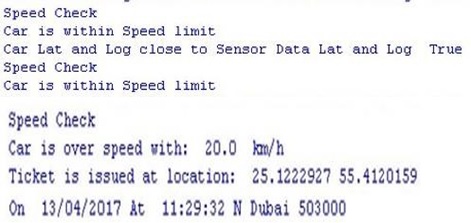
Fig. 11 Generated message
Now, here we see that at the beginning the speed limit was more than 40 km per hour so the message which was visible is “Car is within speed limit”. Then, there is a location when the speed limit is 20 km per hour. The second speed check shows the message “Car is over speed with: 20.0 km/h”. Along with that a message saying “Ticket is used at location: 25.1222927 55.4120159” which means the ticket was issued at a point where latitude is 25.1222927 and longitude is 55.4120159 and the message also mentions the time and date on which the ticket was generated. Here we have the date as 13/04/2017 and the time is 11:29:32 and location is mentioned as North Dubai. We also get a pin code for the ease of understanding. The pin code for this message is seen as 50300. All speed violation records added into the Log File and synchronized with the Transport Authority database. Speed violation records include all the needed details such as Date, Time, Location, and Vehicle Details.
Conclusion
There are around 3 million autos in the UAE. As indicated by gulfnew.com there were around 3,700 passings because of mishaps a year ago. There are a few explanations behind these mishaps, for example, driving under the influence, not adhering to traffic rules, glitch of the vehicle however the most significant reason for these mishaps was over speeding. The UAE police are each year attempting to take new activities so as to decrease these mishaps.
A study directed by inlet news on mishaps in UAE has given some stunning figures. It was gotten that even on the day when this overview was led there were four mishaps in only a time of two hours. Just between the long stretches of January to July a year ago, there was in excess of 1,250 mishaps included vehicle. These mishaps were the significant mishaps that either cost life or genuine wounds. In these mishaps around 23 individuals were murdered and 884 were harmed. In a similar length, there were instances of vehicle accidents and this cost 76 lives and 996 individuals with genuine wounds.
The speed radars and police power present on the ground can't be spread the nation over as it will require significant expenses and a few spots might be such where one can't introduce either. In this way there is a requirement for some innovation which screens vehicle and controls the drivers from over speeding.
The center advancements and there working are as OBD scanner which helps in observing velocity, GPS which tracks current area and sends the information persistently to raspberry pie and Raspberry pie which is the fundamental controlling or figuring unit of the gadget. Here the information gave by the GPS will be utilized to ascertain the speed.
The Main preparing of this framework will incorporate continuous observing of the speed of the vehicle, if the speed builds a particular breaking point, the message will incorporate subtleties of the speed and area of the vehicle and this message will be sent to the closest police division.
Recommendations and future scope
Following are the few recommendations or future scope of the device:
- Tamper alert: This device as mentioned earlier will be installed in the vehicles along with the number plate it is important to make sure that the device is not tampered or compromised by the driver or the owner of the car. We can install a tamper alert feature in smart number plate. When one tries to tamper the number plate alert alarm should ring in the car also a message will be sent to the traffic department, so they can take necessary action. This will help in two ways, firstly if an individual is tampering car without the permission of the owner then the owner will be notified due to the alarm and also the message received by the police department will help them to take necessary actions against the defaulter.
- Use of intelligent system: In case the driver has met with an accident, the intelligent system will come into play. They will analyze the scenario of the place using cameras installed in them. The scenes will then be used in order to determine the severity of the accident. The device will use machine learning and deep learning algorithms in order to determine the severity. Once the severity is determined, it will take necessary actions accordingly. If the severity is determined as normal then no actions will be taken, if the severity is determined to be critical then the nearby hospitals will be notified so that the injuries individual get proper medical attention in the right time. This way it can help in saving people in accident.
- Driving patterns recognition: A driving pattern recognition can be installed in the smart number plate. This will monitor the way of driving of an individual. If the individual is not driving properly it might come to a conclusion that may be vehicle is malfunctioning, or the driver may be drunk or the driver is injured or having any medical condition. Once a flaw in driving condition is confirmed it can notify the authorities to take necessary actions.
These are the few recommendations or future work will might add to our existing project Idea.
Bibliography
A research paper which was written by two students from National institute of Technology and was presented in the 2016 2nd International Conference on Contemporary Computing and Informatics (IC3I). The article was published in the year of 2016 and has more than 4000 reads and is cited by around 10 different publishers. This paper talked about a solution which will assist specialists with observing vehicle at the solace of sitting at their control rooms. Drivers for the most part need to keep a beware of their speedometer so as to ensure that they are under speed limit. This gadget enables driver to know when they are surpassing pace limit and advises specialists just when the driver doesn't back off. The GPS and GSM advancements are profoundly favored in planning such gadgets.
A research paper which was written by authors named Pelegri-Sebastia, Jose & Alberola, Jorge & Llario, Vicente in the year of 2002. Was presented in a conference on Clinical Gastroenterology and Hepatology - CLIN GASTROENTEROL HEPATOL. This article talked about building a device which can be constructed on the concepts of GMR sensor. It was built in a way that it measures the speed of vehicles by the changes in magnetic field. The benefit of this technology was it didn’t require any wire or continuous power supply. But at the same time it was based on image processing and GMR sensors so it will be required to be installed at various places and manpower will be required to monitor the system.
A research paper written by Arpita Kulkarni, Amulya K J, Radhika A D. in the year of 2019. The research paper was presented in a conference related to International Journal of Recent Technology and Engineering. A straightforward two point gadget was likewise utilized, it was with the end goal that it recorded the approaching of vehicle at point and again will record the hour of approaching of vehicle at point B. At that point basically by utilizing separation by time one can ascertain the speed of the vehicle.
An article published in the International Journal of Advanced Research in Computer Science by the authors named Mallidi, S Kumar Reddy in the year 2018. The article spoke about the developing pace of setbacks and passing has prompted establishment of a gadget fueled by IOT. The gadget utilizes advances, for example, raspberry pie and is fueled by AI calculations. The gadget if there should arise an occurrence of a loss investigates the seriousness of the mishap utilizing the AI calculations and on premise of its seriousness tells the mindful specialists with the assistance of GPS and informing modules. The area got by the specialists can assist them with reaching out to the person.
An article written by M. A. Khan and S. F. Khan under the topic IOT based framework for Vehicle Over-speed detection," in the year 2018 during 1st International Conference on Computer Applications & Information Security (ICCAIS) conference. The article talks about a canny innovation with the assistance of IOT can lessen the setbacks due to over speeding. A gadget empowered with GPS with the assistance of insight can realize the speed furthest reaches of that specific locale and subtleties, for example, on the off chance that that area is a clumsy zone and, at that point as far as possible is balanced as needs be. On the off chance that an individual goes past as far as possible the capable specialists are educated right away.
Boddapati Venkata sai Padmaja, Venkata Ratnam Kolluru and Syam Sai Kota in the year of 2019 wrote an article under the title IoT based Implementation of Vehicle Monitoring and Tracking system using Node MCU and presented it at International Journal of Innovative Technology and Exploring Engineering (IJITEE). The article speaks about Forthcoming mishaps can be anticipated utilizing a blend of different sensors which will screen the essence of human and exercises which are uncommon. For example, visit flickering of eyes, liquor location, circulatory strain discovery, and so on. The gadget utilizes hub MCU for following the framework. Alongside these there will two ultrasonic sensors which will screen approaching vehicles. On the off chance that any bizarre exercises are observed a caution will signal and a warning will be sent through mail to an individual in close connection.
Athira Gopal, Haricharann D V, A Harikoushik, Ambrish V, Vineeth VV wrote an article in 2019 under the topic named Automatic Speed Surveillance and Vehicle Alerting System using Internet of Things (IoT) presented in the International Journal of Innovative Technology and Exploring Engineering (IJITEE). The article revolves around the increment in vehicles on street, it is critical to force exacting standards. In any case, it is a human instinct to defy a guideline. So as to keep up the peace it is essential to present a framework which can hold these under tight restraints. A programmed and savvy speed checking framework can be introduced in a vehicle with the end goal that it screens the speed of a vehicle persistently and send the information utilizing recurrence adjustment and WIFI. These framework was basic and simple to actualize.
References
- Kodali, Ravi & Sairam, M.. (2016). Over speed monitoring system. 752-757. 10.1109/IC3I.2016.7918061.
- Pelegri-Sebastia, Jose & Alberola, Jorge & Llario, Vicente. (2002). Vehicle detection and car speed monitoring system using GMR magnetic sensors. Clinical Gastroenterology and Hepatology - CLIN GASTROENTEROL HEPATOL. 2. 1693 - 1695 vol.2. 10.1109/IECON.2002.1185535.
- Arpita Kulkarni, Amulya K J, Radhika A D. (2019). A Research For Tracking Overspeeding Vehicles. International Journal of Recent Technology and Engineering (IJRTE) ISSN: 2277-3878, Volume-8 Issue-2
- Mallidi, S Kumar Reddy. (2018). IOT BASED SMART VEHICLE MONITORING SYSTEM. International Journal of Advanced Research in Computer Science. 9. 738-741. 10.26483/ijarcs.v9i2.5870.
- A. Khan and S. F. Khan, "IoT based framework for Vehicle Over-speed detection," 2018 1st International Conference on Computer Applications & Information Security (ICCAIS), Riyadh, 2018, pp. 1-4.
- Boddapati Venkata sai Padmaja, Venkata Ratnam Kolluru , Syam Sai Kota (2019) IoT based Implementation of Vehicle Monitoring and Tracking system using Node MCU. International Journal of Innovative Technology and Exploring Engineering (IJITEE) ISSN: 2278-3075, Volume-8 Issue-6
- Athira Gopal, Haricharann D V, A Harikoushik, Ambrish V, Vineeth VV (2019) Automatic Speed Surveillance and Vehicle Alerting System using Internet of Things (IoT) International Journal of Innovative Technology and Exploring Engineering (IJITEE) ISSN: 2278-3075, Volume-8 Issue-4, February 2019
- transport. (n.d.). Retrieved from gulfnews: https://gulfnews.com/uae/transport/police-warning-overspeeding-is-top-cause-of-serious-accidents-in-dubai-1.1541665958361
- Kirankumar, J. Samsuresh, and G. Balaji, Member, ACET.(2012) IACSIT International Journal of Engineering and Technology, Vol. 4, No. 1, February 2012
n.d.). Retrieved from semanticscholar: https://www.semanticscholar.org/paper/Wireless-Sensor-Network-for-Vehicle-Speed-and-Megalingam-Mohan/6fdb504554649443e791604442cd159572e3a68c
- (n.d.). Retrieved from arxiv: https://arxiv.org/abs/1905.10982
- document. (n.d.). Retrieved from grin: https://www.grin.com/document/284134
- traffisection-stationary. (n.d.). Retrieved from jenoptik: https://www.jenoptik.com/products/traffic-safety-systems/section-control/traffisection-stationary
- transport. (n.d.). Retrieved from gulfnews: https://gulfnews.com/uae/transport/police-warning-overspeeding-is-top-cause-of-serious-accidents-in-dubai-1.1541665958361
- US7389198. (n.d.). Retrieved from patents: https://patents.google.com/patent/US7389198
- Vehicle-speed-monitoring. (n.d.). Retrieved from gpsgateway: https://gpsgateway.in/Vehicle-speed-monitoring
- vehicle-speed-monitoring-system-market. (n.d.). Retrieved from futuremarketinsights: https://www.futuremarketinsights.com/reports/vehicle-speed-monitoring-system-market


